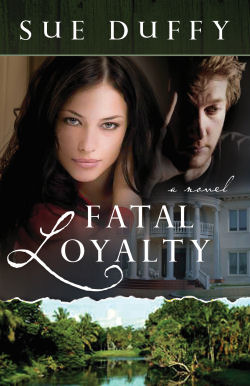|
If
you’re writing a novel while holding down a day job, it helps if your
spouse is a cook or doesn’t mind eating chicken from the gas station
down the street. In my case, it was the Exxon.
It also helps to lobotomize the
part of your brain that controls the impulse to dust. To vacuum. To
pull weeds. In fact, you should come to appreciate those wild-eyed
insurgents in your garden as you would unexpected new characters that
pop up in your book.
I learned to do all of that
while writing my second novel—Fatal Loyalty—at
lunch, at night, on weekends, and during the commute to and from my job
at the newspaper. As the editor of our monthly lifestyle magazine
covering South Carolina’s capital city, Columbia, I wrote on and off
the job. Okay by me. It’s what I do far better than cooking or anything
else that requires a household appliance.
The eight years I edited that
magazine yielded a smorgasbord of book material. The article I wrote on
people who live aboard their boats helped spawn a lead character in my
novel. A quirky, reclusive artist we featured colored in another
character. Covering a midnight story on Lake Murray, the inland sea
that laps at my backdoor, prompted a suspenseful scene in the book.
Interviewing a world-class pianist from Ukraine launched the plot of my
next novel.
If I’d been a claims adjuster or
dental hygienist, the harvest of story feeds from my day job would have
been no less bountiful. Story is everywhere, in every person you meet
or conversation you overhear, in every moment of your day. I once
pulled off the road to jot a few notes for a new novel and found myself
in a cemetery. Glancing up from my scribbling, I noticed the names on
tombstones nearest my car. Then I looked again. I liked the names. They
were uncommon, full-bodied, and would soon attach themselves to my new
characters. Story is everywhere.
If you must work to support your
nocturnal habit of writing novels, use every spare moment to plan where
the story will take you and your characters before
you clock out and go home. Because my night hours were short and my
brain cells quick to expire after a long day at work, I didn’t have the
luxury of lounging in indecision once I cranked up the home computer.
At lunch, I would find a quiet place to slip away to my story—from a
park bench, a back corner of the public library, a Wi-Fi café where the
preoccupied laptop clientele wouldn’t notice the oddball blonde staring
into space for a solid hour, even taking notes on that experience. All
the while, I was charting the narrative I would resume at day’s end.
Later, during the thirty-minute
drive home, I would revisit my lunchtime plans and rehearse my
characters for the roles they would play that night. As rush-hour
traffic swept past me, I heard those characters talk among themselves.
Was that petulance I heard in Andie’s voice? I’d have to work on that.
It wasn’t the mood I wanted for her that night. As I drove, I carefully
plotted the evening’s danger. Through the windshield of my car I could
almost see the lone boat approach the Caribbean hideout of a murdering
drug lord, and I knew the nervous young man at the helm of that boat
would desperately need my guidance that night—as soon as I finished my
Exxon chicken and washed out my pantyhose.
That’s the double life of an
otherwise employed fiction writer. In A Circle of Quiet,
author Madeleine L’Engle says, “. . . for most artists the world of
imagination is more real than the world of the kitchen sink. . . . When
someone comes in to me when I’m deep in writing, I have a moment of
frightening transition when I don’t know where I am, and then I have to
leave the ‘real’ world of my story for what often seems the less real
world, the daily, dearly loved world of husband and children and
household chores.”
But
it’s slipping into that dreamed-up world that captivates us so
completely that we would keep writing our stories even if we worked
double shifts in a coal mine.
|
Where
we write those stories is
critical, I believe. If you have only stolen hours to write, maximize
them by eliminating distractions and, if possible, accommodating your
aesthetic needs. If your house is full of kids, even sleeping ones, and
there are no spare bedrooms, carve out a creative niche for yourself in
a walk-in closet, the attic, or the garage. Paint it a stimulating
color, punctuate it with art and photos that resonate with you, and
soundproof it if you can. I wrote my first novel in an open alcove off
a hallway running between my children’s bedrooms. Insane. When my
husband built our present home, he tucked my office into a far corner
at the end of a hallway. It’s a room banked on three sides by windows
overlooking lots of trees and sky.
I know a full-time professor who
writes his novels in an old country home he bought for weekend
retreats. He writes by hand, sitting up in an antique bed shoved under
an upstairs window from where his mind can ramble through the fields in
search of a plot twist. Another friend who lives alone in a tiny
apartment writes screenplays at night, seated at a TV tray table in one
corner of her kitchen. She says she creates best in a cocoon. Your own
writing nook should comfortably fit you. It should call to you
throughout the day and make you hurry home.
Because my children were grown
by the time I wrote Fatal Loyalty, I was freer than
young-mother writers to retreat with abandon into “the world of
imagination” each night after work. Almost. Though my husband was
content to read or watch a movie alone, it wasn’t right that he should.
Not every night. So I wrote only two or three weeknights and saved the
bulk of the work for Saturdays, when he was normally headlong into
projects around the house. We reserved Wednesday and Saturday nights
for date nights and Sundays for worship and visiting family. It was a
healthy balance energized by my husband’s full support of my literary
pursuits and my conviction that God was blessing our combined efforts.
Without God, the story is no
more than a “resounding gong.” The times I forgot to pray before
writing, my work was limp and tepid. I had plugged in the computer but
not the writer. That vital connection should have gone like this:
“Father, go with me back into the story. Make it come alive with
purpose—yours not mine. Make it turn a head, open a heart, and change a
life.”
I trust He’ll show us all how to
do that—no matter where or when we write.


|









